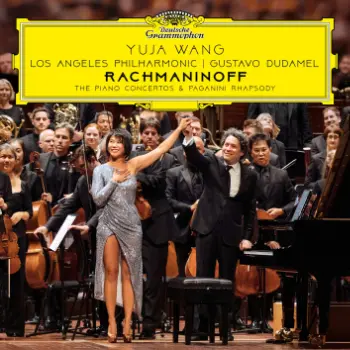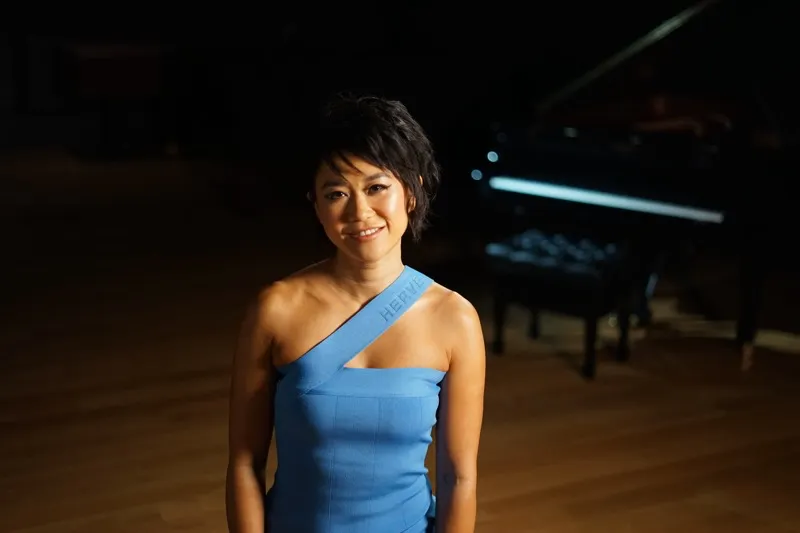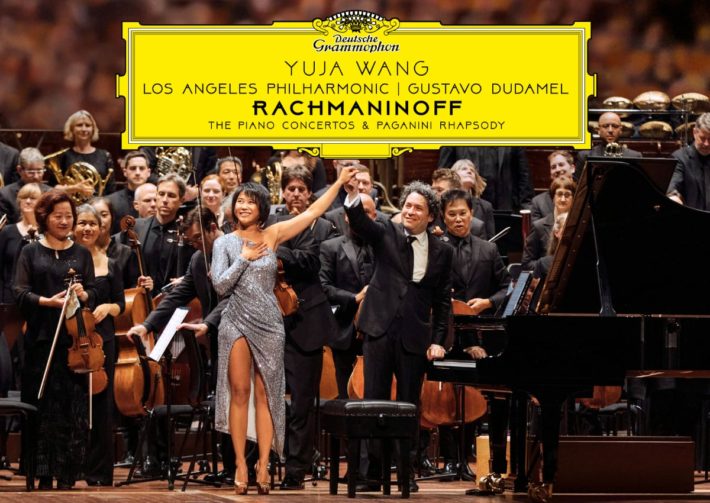In celebration of Rachmaninoff 150, the LA Philharmonic, led by Gustavo Dudamel and joined by the virtuosic Yuja Wang, embarks on an audacious live endeavor: an ambitious program encompassing the complete concerti and the Rhapsody on a Theme of Paganini. As a captivating addition, three of the compositions featured in this collection have previously been recorded by Wang in collaboration with different artists, adding a layer of intrigue and inviting a compelling comparison. Wang’s technical brilliance, synonymous with her artistry, is aptly matched to the demands of Rachmaninoff’s compositions, yet the crux of these performances hinges upon the depth of their interpretative finesse.

The first piano concerto impresses from the get-go with a thunderous opening. A quick pivot is in order when sweeping, pathos-laden first theme arrives. The stark contrast is indeed there, though not as finessed as in the Michael Pletnev/Libor Pesek recording: Pletnev’s lyricism better supported by his fluid accompaniment and the orchestra has more defined phrasal contours. Wang’s fast passages, however, are impeccable as is the cadenza: she gives due attention to secondary melodic voices that highlight the lyrical intricacy of the writing. As for the other movements, the Finale sparkles with pianistic virtuosity and fine-tuned articulation from the orchestra.
Wang recorded the Second Concerto for DG back in 2011 with Claudio Abbado, so I was curious to see if anything had changed across the decade-or-so gap. The tempo of this new first movement is on the slow side when we consider nicely paced versions like Howard Shelley/Bryden Thomson or Kirill Gerstein/Kirill Petrenko. While a greater sense of flow is wanting, Wang and Dudamel make up for it with voluminous sound and an undeniable presence. In the passages which call for agile fingerwork, Wang largely eschews the pedal, and this creates the electricity elemental in moving toward the movement’s high point.
The second movement is deeply personal in how Rachmaninoff pairs the piano with different solo instruments—or so it should be. I found this rendition much too matter-of-fact: the piano’s triplets are somewhat metronomic and some of the instruments seem to struggle to keep up with the rather brisk pace. Her 2011 recording doesn’t move all that much slower but is noticeably more expressive and integrated with the woodwinds.
Any pianist will admit to the devilish difficulty of the Finale; Wang, however, shows no signs of being challenged whatsoever. She achieves marvel-worth clarity through drier articulation and crisp staccatos. The orchestra does its due diligence in upkeep of energy all the way to a jubilant conclusion. There’s plenty of depth and integration in its sound which complements the pianist’s acrobatic flair.
Wang and Dudamel recorded the third concerto together on a live performance from 2014 with the Simon Bolivar Symphony. The opening unison, the easiest thing to play technically, require musical finesse to balance its simplicity with a sense of enigma. Although the 2014 version has some issues with sound balance, it better captures this profile; while the recent counterpart is lyrical, listeners might find it too extroverted. The aforementioned granularity can be heard again, when the accompanimental figures call for a more fleeting, whimsical touch. The second theme, however, is lovely in how Wang dovetails her lines tenderly with that of the solo bassoon and French horn. Admittedly, I’d like to have experienced a little more organic momentum as one too many notes are dwelled upon. Argerich under Chailly shows a pianist taking her time in choice moments but giving rhapsodic pushes to propel forward.
I’d always hoped to hear Wang play the larger cadenza out of the two available, given her pianistic facility, but she’s consistently featured the shorter version. Her command of it, however, doesn’t disappoint nor does the unfettered fluidity that I’d wished to hear in tandem with the orchestra.
The Intermezzo stands as one of Rachmaninoff’s most exquisite slow sections and in this instance, a harmonious interaction unfolds: the orchestra and Wang engage in a dynamic dialogue that is both expressive and introspective, characterized by sweeping, turbulent, and impassioned moments.
The Fourth Concerto, though poorly received in its premiere and subsequently revised, embodies an adventurous and experimental spirit not necessarily heard in the more popular concerti. Rachmaninoff had intended to streamline musical ideas; indeed, transitions do sound more abruptly juxtaposed, yet this is exactly what drives its flurried energy. The performers fuel the anticipatory buzz (courtesy of the orchestra’s peppery repeated notes) and maintain a welcome rhythmic bounce; Wang’s runs are light but also have the right amount of urgency.

Yuja Wang (image: ©️ BBC Studios)
In the Largo, Wang gives her opening passage a relaxed, improvisatory character which sets the right mood—but the orchestra unfortunately doesn’t quite take the cue, coming in sounding a bit too subdued. Subsequent transitions between piano and ensemble are much smoother. The players also derive dimensionality from the repeated motifs by infusing colors into the different harmonic iterations. Overall this is a spontaneous and energetic fourth, yet not as revealing as Trifonov’s rendition of the piece, as Tal Agam reviewed back in 2018.
A perennial audience favorite, the Rhapsody on a Theme of Paganini is also a second run for Wang: the Abbado disc mentioned prior also features the work. The first A minor section (Theme and Var. 1-10) lets the orchestra feature its own fast passages: Var. 3, for instance, scurries and rustles along with good clarity from the violins and flute. Var 9 sets up a spirited rhythmic showdown between the ensemble and insistently syncopated soloist.
The famed D-flat major variation everyone looks forward to is in Section 2 (Var. 11-18). Wang’s solo is emotive and beautifully contoured, but steers clear of unnecessary melodrama. The orchestral sostenutos are beautiful but something is missing: could it be the slightly rushed phrases or that the lines feel a little flat? This is one moment in the work that we want to savor as long as we can, but it feels frustratingly snatched away especially given the wonderful piano opening. Turn to Daniil Trifonov/Yannick Nézet-Séguin and you’ll hear how the orchestra really milks the moment with expansive, well-crafted lines that sweep us up in the romantic character.
In the final return to A minor, Wang brings out the martial nature of Var. 22 with precise and well-voiced chords. The rumbling octave buildup at its conclusion kicks up the energy a notch in perfect time for the final high-energy variations, which are a combination of heater-skeleter jumps and glittering interlocking chords. The closing two notes do need more finality and maybe a touch of sarcastic humor that the Pletnev/Pesek version so cleverly adds.
Hits and misses in each of the concerti make reference recordings remain preferred listening points. However, the enormity of this feat — not to mention as live performances — already deserves praise and a thoughtful listen.
Recommended Comparisons
Pletnev | Argerich | Wang & Abbado | Wang & Dudamel | Trifonov | Zimerman | Hough
Rachmaninoff – The Piano Concertos & Paganini Rhapsody
Yuja Wang – Piano
Los Angeles Philharmonic
Gustavo Dudamel – Conductor
Deutsche Grammophon, CD 4864943




















